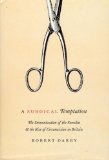Book: A Surgical Temptation: The Demonization of the Foreskin and the Rise of Circumcision in Britain
 The book A Surgical Temptation: The Demonization of the Foreskin and the Rise of Circumcision in Britain is a critical look at why male infant circumcision became prevalent in Britian.
The book A Surgical Temptation: The Demonization of the Foreskin and the Rise of Circumcision in Britain is a critical look at why male infant circumcision became prevalent in Britian.
The Victorian era is examined, along with the medical establishment's idea at that time that the foreskin must be excised as a routine precaution against every imaginable sexual dysfunction, from syphilis and phimosis to masturbation and bed-wetting. Why Britain adopted a practice it had traditionally abhorred and then abandoned it after only two generations is the subject of A Surgical Temptation.
The author reveals that circumcision has always been related to the question of how to control male sexuality. Many men in the US claim that their infant circumcision has not affected them in any way. Unfortunately, men cut at birth have no way of telling how their sexual pleasure has been affected by their infant circumcision. This book attempts to add a ray of light to the circumcision controversy.
"This book should be required reading for American physicians in particular, especially those who continue to perform an operation seldom practiced in the rest of the world and who might not know why it was originally begun." (Robert A. Nye JAMA )
The book has been reviewed in the journal of Victorian Studies, Vol. 48, No. 1, pp. 147-49 (Autumn 2005). "Robert Darby insists only that Victorian doctors came strongly to believe that the penis needed to be controlled and regulated, and that an important means to this end was the demonization and removal of the foreskin."
Disclaimer: The book links above will take you to Amazon.com, where, if you buy the book, I will make about 26 cents and will be that much closer to retiring to my Caribbean island.
- Login to post comments

Comments
#1 British snobbishness and the bald penis
In my opinion, Darby is a richer scholar of human sexuality and the culture of parenting than Gollaher, who wrote a related book about the rise of circumcision in the USA.
British routine circ fascinates because of the way it blended in with the British class system. So much so that a slang name for the circumcised penis was "toff penis." At Eaton and Harrow, 80-90% of the boys were cut. At the upper middle class boarding school Richard Dawkins attended in the 1950s, 50-60% of the boys were cut. Among the sons of men who ate fush and chups and threw darts in pubs, the circ rate was at best 10%. The overall rate never exceeded 35%. British circumcision became like a "cattle brand" denoting better origins, having a mother with aspirations.
In 1945, the British people elected the most left wing government ever. Is it any surprise that that government defunded routine circ in 1950? Why should the taxpayer pay the toffs to have cosmetic surgery done to their penises, so that the toffs would recognise each other in sports changing rooms and when doing Army service?
Because the author is a gay male, he has difficulty appreciating the mind set of British mums and nannies regarding boys' penises. The discovery of bacteria and of the role of human waste in propagating disease was a compelling reason to keep the genitalia clean. But upper British mums, and the nannies they hired, felt that to concern themselves with a boy's penis was beneath their dignity. They also believed that a circumcised boy was clean merely by sitting in his nightly bath. Hence they had boys circumcised so they would be spared having to be concerned about that part of his anatomy. By doing this, British mums revealed that foreplay done to their husbands was not a significant factor in the marital sex life of British upper women. Any surprise??
#2 Thanks for the historical context
Thanks for the historical context. Being raised in the United States I have learned little about British history other than what I glean from reading literature.
No surprise about British mums and their lack of foreplay. Unfortunately, I beleive that situation is still prevalent today across the pond.